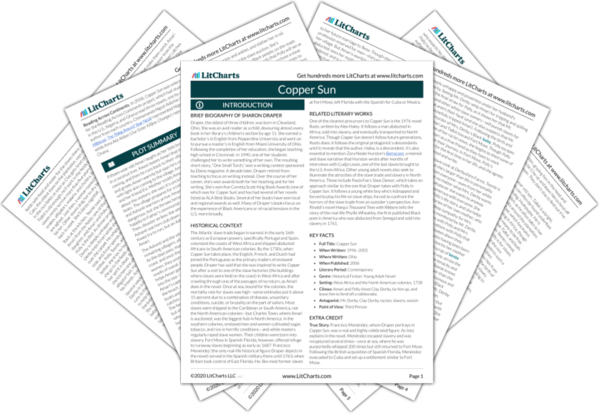Clay Derby Quotes in Copper Sun
The young Master Derby carried a small whip, and he used it liberally to make Noah work faster. Polly noticed that the slave breathed slowly and loudly, as if he was tense, but he made no attempt to stop the young man from hitting him. She was always amazed at how much abuse slaves took without it seeming to bother them.
Teenie paused, then said, “For me, it was the overseer, Willie Badgett. Eventually, they gets tired of you and moves on—but the terribleness of it just goes to another slave woman.”
“Do you think Mrs. Derby knows what Clay is doing?”
“She know,” Amari said angrily.
“Maybe she can help you,” Polly offered tentatively. “She seems to be very pleasant.”
“She need help herself,” Amari replied sharply.
Polly tried to understand, but she couldn’t truly fathom the depths of Myna’s apparent distress. Slave women were always called to the bedrooms of their masters—it was simply a fact of life. Myna should understand that by now and be getting used to it.
Isabelle Derby sat pale and quiet, her eyes cast down through most of the meal. It was as if she was one of the many room decorations. Unhappiness seemed to ooze from her like perspiration on a humid day. Polly shook her head as she realized that being a fine lady didn’t necessarily mean finding joy.
“My name be Amari,” she informed the two of them.
Polly opened her eyes and looked at Amari with a slight frown. “What’s wrong with the name they gave you?” she asked. “We’re used to it now.”
Amari took a deep breath of the woodsy air. “Not Myna no more. Amari.” She spoke with clarity and certainty.
If you say so,” Polly said with a shrug. “I suppose it is a good name for a free woman.”
“Free!” Amari exclaimed in quiet exultation. She had no intention of ever using that slave name ever again.
What shall I do? Amari thought helplessly. She willed herself to imagine her mother who would know what to say and how to comfort her. All of her mother’s dreams of growing old and watching her grandchildren play had been brutally dashed into the dust. This child carries the spirit of my mother, Amari realized suddenly, as well as the essence of her father, little Kwasi, the murdered people of her village, and the spirits of all her ancestors.
She inhaled sharply as she thought of Mrs. Derby, of the infant who had been given no chance to live, and of all the other women, both black and white, who continued to suffer as property of others.

Clay Derby Quotes in Copper Sun
The young Master Derby carried a small whip, and he used it liberally to make Noah work faster. Polly noticed that the slave breathed slowly and loudly, as if he was tense, but he made no attempt to stop the young man from hitting him. She was always amazed at how much abuse slaves took without it seeming to bother them.
Teenie paused, then said, “For me, it was the overseer, Willie Badgett. Eventually, they gets tired of you and moves on—but the terribleness of it just goes to another slave woman.”
“Do you think Mrs. Derby knows what Clay is doing?”
“She know,” Amari said angrily.
“Maybe she can help you,” Polly offered tentatively. “She seems to be very pleasant.”
“She need help herself,” Amari replied sharply.
Polly tried to understand, but she couldn’t truly fathom the depths of Myna’s apparent distress. Slave women were always called to the bedrooms of their masters—it was simply a fact of life. Myna should understand that by now and be getting used to it.
Isabelle Derby sat pale and quiet, her eyes cast down through most of the meal. It was as if she was one of the many room decorations. Unhappiness seemed to ooze from her like perspiration on a humid day. Polly shook her head as she realized that being a fine lady didn’t necessarily mean finding joy.
“My name be Amari,” she informed the two of them.
Polly opened her eyes and looked at Amari with a slight frown. “What’s wrong with the name they gave you?” she asked. “We’re used to it now.”
Amari took a deep breath of the woodsy air. “Not Myna no more. Amari.” She spoke with clarity and certainty.
If you say so,” Polly said with a shrug. “I suppose it is a good name for a free woman.”
“Free!” Amari exclaimed in quiet exultation. She had no intention of ever using that slave name ever again.
What shall I do? Amari thought helplessly. She willed herself to imagine her mother who would know what to say and how to comfort her. All of her mother’s dreams of growing old and watching her grandchildren play had been brutally dashed into the dust. This child carries the spirit of my mother, Amari realized suddenly, as well as the essence of her father, little Kwasi, the murdered people of her village, and the spirits of all her ancestors.
She inhaled sharply as she thought of Mrs. Derby, of the infant who had been given no chance to live, and of all the other women, both black and white, who continued to suffer as property of others.











